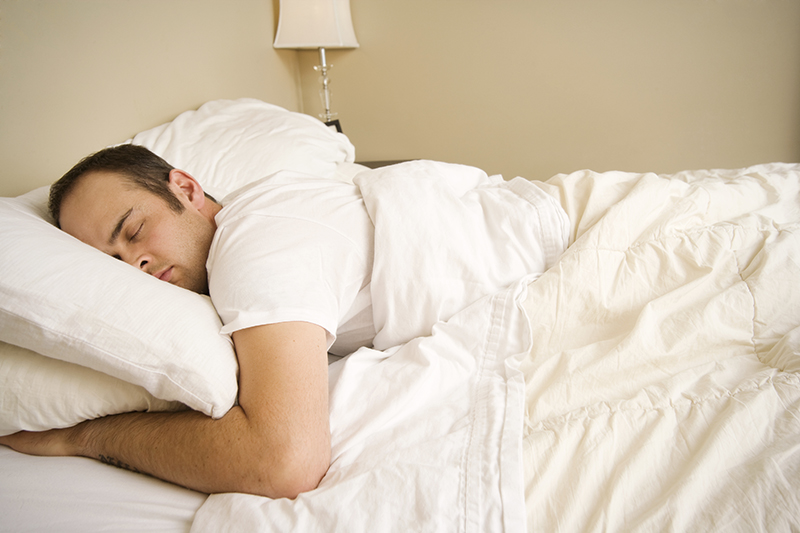Getting a Good Night’s Sleep
By Ryan G. Wetzler, Psy.D., C.B.S.M.
Why do we sleep?
 The function of sleep is still a topic of much debate. Currently there are numerous theories depicting how sleep may play in important role in mood regulation, memory formation, energy restoration, and learning. Most of what we know about the importance of sleep comes from studies designed to assess the impact of sleep deprivation. Depending on the particular type or stage of sleep that is lacking, different symptoms may be experienced. For instance, changes in dream sleep (REM sleep) have been associated with depression, anxiety, and memory problems, whereas disruption of deep sleep (delta-wave sleep – stages 3 and 4) has been associated with increased experiences of pain. Common sleep disorders including insomnia disrupt these important types or stages of sleep and therefore may represent an important target for treatment.
The function of sleep is still a topic of much debate. Currently there are numerous theories depicting how sleep may play in important role in mood regulation, memory formation, energy restoration, and learning. Most of what we know about the importance of sleep comes from studies designed to assess the impact of sleep deprivation. Depending on the particular type or stage of sleep that is lacking, different symptoms may be experienced. For instance, changes in dream sleep (REM sleep) have been associated with depression, anxiety, and memory problems, whereas disruption of deep sleep (delta-wave sleep – stages 3 and 4) has been associated with increased experiences of pain. Common sleep disorders including insomnia disrupt these important types or stages of sleep and therefore may represent an important target for treatment.
What is insomnia?
Insomnia refers to difficulty getting to sleep, staying asleep and/or an experience of non-refreshing, poor quality sleep. People who suffer from insomnia will frequently take an extended time to initiate sleep at night (greater than 30 minutes) or may spend extended periods (greater than 30 minutes) awake in the middle of the night. Chronic insomnia is any experience of insomnia that occurs for longer than a month. Chronic insomnia frequently leads to increasing levels of depression, anxiety and fatigue. It may also negatively affect memory function, concentration, and ability to work.
What is the link between depression, bipolar disorder, and sleep problems?
Sleep disruptions are extremely common in people who have depression, mania, and anxiety disorders. In depression, people can either sleep too little or too much. The most frequent pattern of sleep disturbance in mania or hypomania is having a decreased need for sleep. If you experience an episode of depression or mania, one of the principal targets of treatment will be to normalize your sleep pattern. For persons with acute symptoms of depression or mania, medications are often an important part of the treatment plan. But, the methods described below for cognitive-behavioral treatment of insomnia can also be helpful.
What treatments are available for insomnia?
 Effective treatment strategies are available for insomnia. If insomnia is short term (experienced for less than a month), or intermittent (experienced only occasionally), then sleep medications may represent a reasonable treatment option. If sleep problems are directly tied to an episode of depression or bipolar disorder, then antidepressants or mood stabilizers may be very helpful.
Effective treatment strategies are available for insomnia. If insomnia is short term (experienced for less than a month), or intermittent (experienced only occasionally), then sleep medications may represent a reasonable treatment option. If sleep problems are directly tied to an episode of depression or bipolar disorder, then antidepressants or mood stabilizers may be very helpful.
Sleep medications are generally not considered the best long-term treatment option for chronic insomnia. Sleep medications may lead to dependence and addiction. They may also lose their effectiveness over time or simply not work in cases of chronic insomnia. An excellent option for chronic insomnia is a non-drug therapy called cognitive-behavioral treatment of insomnia (CBT-I). This approach has been specifically designed to treat chronic insomnia and shows very good outcomes, with 70-80% benefiting from treatment. CBT-I can enable those using sleep medications to not only sleep better, but to reduce and even eliminate their use of sleep medications.
What is cognitive-behavioral treatment of insomnia (CBT-I) and why haven’t I heard of it before?
Cognitive-behavioral treatment of insomnia (CBT-I) is a specific, highly practical therapeutic approach to overcoming chronic insomnia. It has been developed over the past several decades and found to be more effective than sleep medications in treating chronic insomnia. It is now recommended as a first line treatment for chronic insomnia, yet many healthcare providers and insomnia sufferers are not aware of this powerful treatment. To meet the demand for qualified providers, the American Academy of Sleep Medicine has developed a certification program to acknowledge specialists who provide CBT-I and can evaluate other sleep-related difficulties. A list of certified providers is available at the following website: http://www.aasmnet.org/BSMSpecialists.aspx.
Certified behavioral sleep medicine specialists in the Louisville area include Ryan Wetzler, Psy.D., of Sleep Medicine Specialists) and Dr. Fidaa Shaib, MD, DABSM, CBSM, director of the University of Louisville Sleep and Wake Disorders Program. Also, many doctors and therapists who have been trained in using cognitive-behavior therapy for depression and anxiety can provide CBT for insomnia. The Depression Center at the University of Louisville has acognitive-behavior therapy program with clinicians such as Jesse H. Wright, M.D., Ph.D. and Virginia Evans, L.C.S.W.who can assist persons with insomnia.
How does CBT-I differ from other forms of psychotherapy?
CBT-I is a straightforward and collaborative process of evaluating the specific reasons why somebody is not sleeping well, followed by a systematic process of developing and applying practical solutions to the problems identified. Although CBT-I is considered a psychotherapeutic process, it is much different than traditional “psychotherapy.” Providers do not have couches in their offices and don’t typically ask patients “so how does that make you feel.” Instead, the treatment process is more like taking your own personal insomnia treatment class and the provider is more like a teacher or coach.
How and why does CBT-I work?
CBT-I works by correcting problems in the 4 bodily systems that can contribute to sleep disturbance. These systems include the sleep-drive system (what makes us tired), the circadian timing system (what regulates when we sleep), the learning system (what determines how we react to life challenges), and the stress system (what keeps us awake). Each of these systems can affect how we sleep. CBT-I teaches strategies to correct the functioning of each of these systems to allow for good quality sleep to occur. In a way, CBT-I “resets” bodily systems that regulate sleep. Since the bodily systems that regulate sleep also play a role in regulation of mood, pain, and other bodily processes, skills developed through the treatment process may also have a positive impact on mood, anxiety, pain and other associated medical or psychiatric conditions.
How would I know whether CBT-I is right for me?
Good candidates for CBT-I include those who:
- Have chronic insomnia.
- Would prefer a non-drug solution to their sleep disturbance and/or have not responded adequately to sleep medications.
What are some general good tips for improving sleep?
Here are some suggestions for getting a good night’s sleep. These methods can help people get into a healthy sleeping pattern. But, persons with chronic insomnia may need professional help with CBT-I to fully overcome their sleep problems.
- Fix a standard bedtime and an awakening time.
- Avoid napping during the day.
- Avoid alcohol 4 – 6 hours before bedtime.
- Avoid caffeine at least 8 hours before bedtime, or in the case of severe insomnia try to eliminate caffeine altogether.
- Avoid nicotine 4 – 6 hours before bedtime.
- Avoid heavy, spicy, or sugary foods 4 – 6 hours before bedtime.
- Exercise regularly, but not right before bed.
- Practice relaxation techniques before bed.
- Try a light snack before bedtime.
- Minimize noise, light, and temperature extremes during sleep with ear plugs, window blinds, or an air conditioner.
- Try to avoid having distracting things in the bedroom such as exercise equipment, bills, work assignments that you have brought home, etc.
